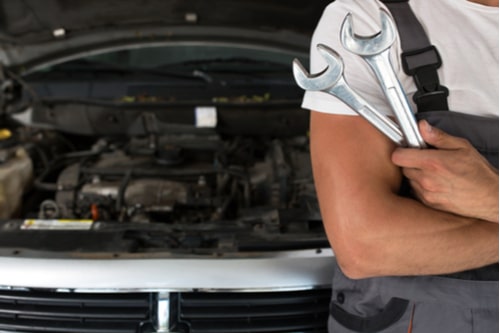
Car Broke Down? Should You Fix It or Buy a New Car?
Few things ruin your day faster than when your car breaks down on the way to work or while running errands. Suddenly, you’re faced with a stressful question: should you pay for repairs, or put that money toward a newer, more reliable car?
The right choice depends on your car’s value, the cost of repairs, and your financial situation. Let’s break it down with real examples, expert advice, and a simple framework to help you decide.
Is the Cost To Fix Your Vehicle Worth It?
Step 1: Calculate Your Car’s Value vs. Repair Costs
Before making any decision, look up your car’s current market value using resources like Kelley Blue Book or Edmunds.
- Formula: Repair Cost ÷ Car Value = Repair-to-Value Ratio
- Rule of Thumb:
-
-
50% or less → Repairs are usually worth it.
-
70% or more → Replacing often makes more sense.
-
Example: If your 2012 Honda Accord is worth $4,000 and the transmission repair is $3,000, your repair-to-value ratio is 75%. In this case, it may be smarter to move on.
Step 2: Factor in Common Repair Costs
Understanding typical repair expenses helps put things in perspective:
- Transmission replacement: $3,000–$5,000
- Engine replacement: $4,000–$6,000
- Timing belt: $500–$1,000
- Brake replacement: $300–$800
- Suspension repair: $1,000–$2,500
If your car is facing one of the “big-ticket” repairs like a transmission or engine replacement, it’s often better to put the money toward a newer vehicle.
Step 3: Consider Reliability and Age
Some vehicles are known to last longer than others. According to Consumer Reports, brands like Toyota and Honda often stay reliable past 200,000 miles, while others may require frequent, costly repairs sooner.
Also, consider the car’s maintenance history. If repairs are becoming more frequent, your “cheap fix” today could lead to another breakdown next month.
Step 4: Compare Financial Outcomes
When deciding whether to repair or replace, think beyond the repair bill:
Keeping the Old Car
- Lower insurance costs
- No new monthly car payment
- You already know the car’s quirks
- Risk: future breakdowns may continue
Buying a New (or Newer) Car
- Warranty protection & fewer surprise repairs
- Safer and more fuel-efficient
- Higher upfront cost or monthly payments
- Insurance premiums may rise
Step 5: How Car Title Loans Can Help in a Financial Emergency
Even if repairing your car is the right choice, covering a big repair bill can feel overwhelming. That’s where car title loans can help. A title loan lets you use your car’s equity as collateral to secure fast cash, often on the same day, making it a practical option for emergency loans.

Understanding Wisconsin Title Loans and How They Work
If paying for repairs feels impossible right now, exploring your financing options could be the next step—and one of the fastest solutions available is a Wisconsin title loan.
How Do Title Loans Work?
With a Wisconsin title loan, you temporarily use your vehicle’s title as security for the loan while still keeping and driving your car. Once approved, you can get cash in as little as 30 minutes and repay it in scheduled installments.
What Do You Need to Qualify?
Most lenders, including Wisconsin Auto Title Loans, Inc., have simple requirements:
- A vehicle in your name with a lien-free title
- A government-issued photo ID
- Proof of income or ability to repay
- The vehicle for a quick inspection
Benefits of Wisconsin Auto Title Loans, Inc.
Choosing Wisconsin Auto Title Loans, Inc. comes with several advantages:
- Speed: Get cash the same day, often within 30 minutes
- Flexibility: Keep driving your car while repaying the loan
- Accessibility: Approval doesn’t depend solely on credit history
- Local expertise: As a trusted Wisconsin lender, they understand the needs of drivers facing car repair or breakdown emergencies
Whether you’re facing a costly repair or trying to cover related expenses, a car title loan from Wisconsin Auto Title Loans, Inc. can provide the short-term financial support you need to get back on the road.
FAQs
Q: Is it worth fixing a car with over 200k miles?
A: Only if the repair is minor and the car has been well-maintained. Major repairs at this mileage usually aren’t cost-effective.
Q: At what point should I stop putting money into my car?
A: When repairs exceed 50–70% of the car’s current market value, or become frequent and unpredictable.
Q: What’s the most expensive car repair?
A: Engine or transmission replacements, which can run $4,000–$6,000 or more.
Q: Should I repair or replace my car after a breakdown?
A: Use the repair-to-value ratio and factor in reliability, age, and your financial flexibility.
Q: Where can I get financial help for car repairs?
A: Local lenders offering Wisconsin title loans, such as Wisconsin Auto Title Loans, Inc., provide same-day emergency loans to help cover repair bills when savings fall short.
Ready to Get Back on the Road?
Don’t let a sudden breakdown keep you stranded. If costly repairs are holding you back, Wisconsin Auto Title Loans, Inc. can help. With fast and flexible car title loans and emergency loans, you can get the cash you need in as little as 30 minutes—without giving up your car.
Apply online today or visit your nearest Wisconsin Auto Title Loans, Inc. location to find out how much cash you can get. The sooner you act, the sooner you’ll be back on the road with peace of mind.
Note: The content provided in this article is only for informational purposes, and you should contact your financial advisor about your specific financial situation.

